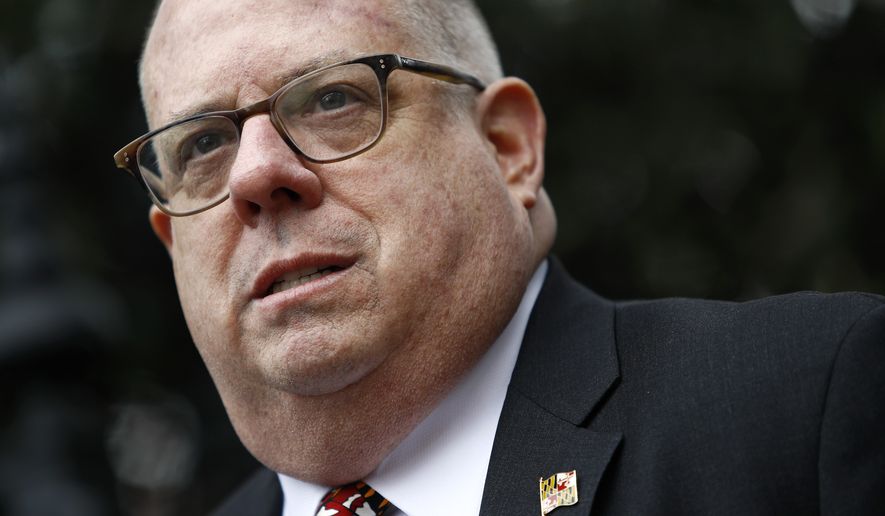Republicans Charlie Baker of Massachusetts and Larry Hogan of Maryland are the two most popular governors in America, and they’re also cruising to re-election in two of the bluest states in the country.
While the rest of the country braces for a potential anti-GOP wave, Mr. Baker and Mr. Hogan have overseen strong state economies and found ways to avoid the nasty divisions over President Trump that have ensnared the political conversation in so many other races.
They’ve hewed to the center on hot-button issues such as immigration, and have also avoided Trump-style rhetorical bombs, leaving them with approval ratings that would be the envy of any governor.
“They are not in love with Donald Trump even though they are in the GOP,” said Louis Jacobson, a political analyst who handicaps gubernatorial races for Governing Magazine. “It’s a combination of political realities that they’re sort of bending to, and also their own personal preferences and ideology.”
Mr. Baker had a 70 percent approval rating and Mr. Hogan was at 67 percent — first and second in the country, respectively — according to Morning Consult’s latest tally sheet.
That’s partly because they retain solid GOP support, but they’ve been able to build bridges across the aisle.
Indeed, more Democrats than Republicans actually said they approve of the job Mr. Baker is doing in a Suffolk University poll released last month.
David Paleologos, director of the Suffolk University Political Research Center, said that survey was taken right after a Sept. 4 primary that saw Mr. Baker fend off a conservative challenger, which may have affected the numbers. But he said it’s clear Mr. Baker runs strong among independent voters, who are the real “big prize” in Massachusetts.
Fifty-nine percent of Republicans said they approve of the job Mr. Baker is doing in the poll — compared to 71 percent of Democrats and 76 percent of independents.
“Baker’s independent stances on a wide variety of issues play to those voters,” he said.
Mr. Baker, for example, is pro-choice, and earlier this year signed legislation repealing pre-Roe v. Wade abortion restrictions, as an insurance policy should the U.S. Supreme Court overturn that 1973 decision that created a national right to abortion.
He also wrote a letter to the Trump administration challenging its moves to restrict federal funding for certain family planning services.
The balancing act has crated some headaches.
At a recent debate with Democratic opponent Jay Gonzalez, he initially declined to say whether he would personally vote for Republican Geoff Diehl, a staunchly pro-Trump Republican challenging Sen. Elizabeth Warren. He eventually said he would back the GOP nominee.
Both Mr. Baker and Mr. Hogan have also tacked toward the center in some cases on the issue of gun control. Everytown for Gun Safety, the gun control group co-founded by former New York City Mayor Michael Bloomberg, recently endorsed Mr. Baker for re-election.
Mr. Hogan also said earlier this year he would reject any endorsement from the National Rifle Association after winning their support in 2014.
Such political calculations appear to be working, as political handicappers say both incumbents are likely to win next month.
Mr. Hogan has close to a 19-point lead over Democratic challenger Ben Jealous in the latest Real Clear Politics average, and Mr. Baker is in an even stronger position, leading Mr. Gonzalez by 35 points.
GOP strategist Ford O’Connell said Republican voters will give some leeway to the governors on key party issues like guns and abortion if that’s what it takes to win in tough areas.
“There’s no point in being able to push the map and go to places where we don’t normally go just because someone isn’t a pure polemic and then cut off our nose to spite ourselves,” Mr. O’Connell said.
Left without room to campaign in the center, the governors’ Democratic opponents have countered by advancing sweeping left-wing agendas such as universal government-sponsored health care, hiking the minimum wage and offering debt-free college.
The Jealous campaign says it thinks that’s working in Maryland, pointing to an uptick in absentee ballot requests as evidence the liberal state is getting energized over a liberal champion.
Voters “want Maryland to get back to delivering on big achievements, whether that’s leading the nation in public education or making sure we all have access to affordable and high quality healthcare,” Mr. Jealous said.
Still, the polling suggests voters are content with their moderate governors — even as both states are poised to re-elect avowedly liberal U.S. senators. That means, for example, that in Massachusetts many voters will pull the lever for Mr. Baker at the same time they also vote for left-wing champion Sen. Elizabeth Warren.
Those crossover voters could be people who like how things are going in their states — but who also oppose Mr. Trump and want to see that opposition represented in Washington, said Todd Eberly, a political science professor at St. Mary’s College of Maryland.
“[Hogan] has nothing to do with what’s happening in Washington,” he said. “It points to voters as being a bit more sophisticated than sometimes people think they are, and I think that’s something that we sometimes lose sight of.”
Both men have also been willing to break publicly with Mr. Trump when necessary, particularly on immigration. Both withdrew state National Guard troops from the southern border this year over the administration’s zero tolerance border enforcement policy.
Mr. Hogan has also gone through a public bout with skin cancer this year, adding a personal element to his persona as a successful businessman.
“Being a cancer survivor and being someone who’s really done what is largely seen as a good job in his state — both economically and not resorting to partisan tactics — has served him well,” Mr. O’Connell said.
• David Sherfinski can be reached at dsherfinski@washingtontimes.com.




Please read our comment policy before commenting.